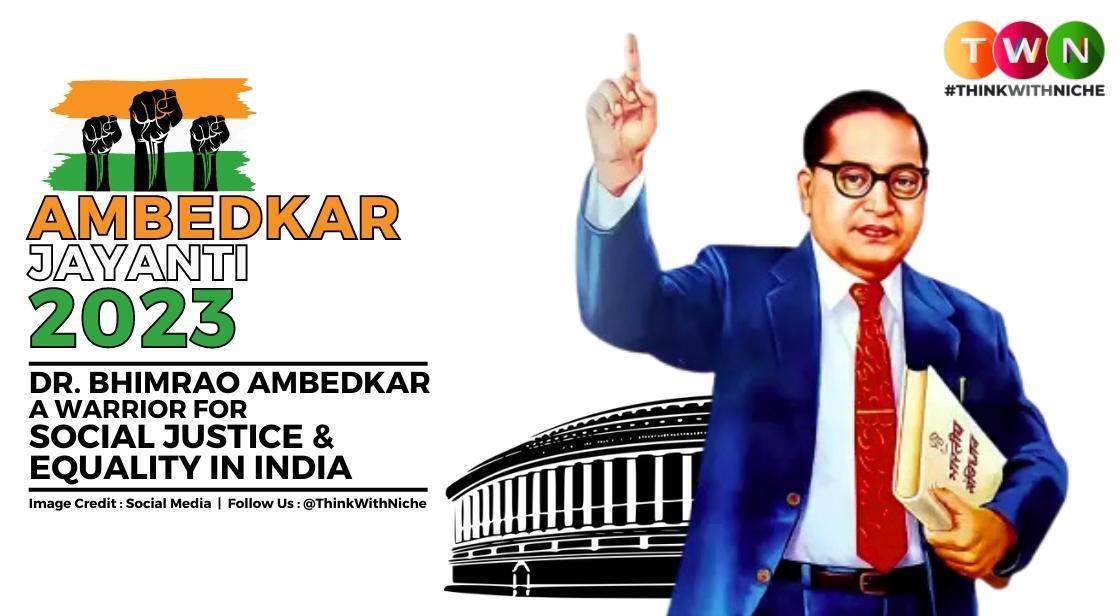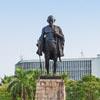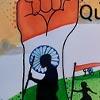Dr. Bhimrao Ambedkar: A Warrior For Social Justice And Equality In India

Blog Post
Dr Bhimrao Ambedkar's birth anniversary also known as Ambedkar Jayanti 2023 is celebrated on April 14th, every year. This day is observed as a public holiday in India to honor the memory of Dr. Ambedkar, who is also known as the father of the Indian Constitution. He was born on April 14, 1891, in Mhow, Madhya Pradesh, India.
Dr Babasaheb Bhimrao Ramji Ambedkar was a prominent social reformer and politician who dedicated his life to fighting for the rights of the oppressed and marginalized communities in India, especially the Dalits. He played a crucial role in the drafting of the Indian Constitution and was instrumental in the inclusion of provisions for the protection of the rights of Dalits and other marginalized groups.
On his birth anniversary, various events and programs are organized across the country to pay tribute to his contributions and to spread awareness about his life and work. The day is also an occasion to reflect on the progress made in advancing the rights of marginalized communities and to renew the commitment to continue the struggle for social justice and equality.
Dr Bhimrao Ambedkar was a visionary leader and social reformer whose contributions to the social, political, and economic development of modern India are unparalleled. His struggles against caste-based discrimination and his tireless efforts to secure equal rights and opportunities for all Indian citizens have left a lasting legacy. His role in drafting the Indian Constitution, his involvement in various movements, and his impact on the American civil rights movement are a testament to his dedication to the cause of social justice. Today, on his birth anniversary, we remember and celebrate the life and achievements of this iconic figure in India's history.
#DrBhimraoAmbedkar
#LifeOfBhimraoAmbedkar
#AmbedkarJayanti
#WorldBiggestJayanti
#AmbedkarImages
#AmbedkarBirthdayDate
Dr Bhimrao Ambedkar was a prominent social reformer, jurist, economist, and politician who devoted his life to fighting for the rights of the oppressed and marginalized communities in India. He is widely regarded as the father of the Indian Constitution, and his contributions to the social, political, and economic development of modern India have left a lasting legacy. In this article, we will explore the life and achievements of Dr Ambedkar, including his early life, education, struggles, role in the Indian Constitution forming, movements, contributions, Poona Pact India, and the American civil rights movement.
Dr. Bhimrao Ambedkar: A Warrior For Social Justice And Equality In India
Early Life and Education
Bhimrao Ramji Ambedkar was born on April 14, 1891, in Mhow, Madhya Pradesh, India. He was born into a family belonging to the Mahar caste, which was considered untouchable and subject to discrimination and social exclusion. Despite facing numerous obstacles, Ambedkar was a brilliant student and excelled in his studies. He graduated from Elphinstone College in Bombay and then went on to study law at the University of Mumbai. In 1915, he obtained a scholarship from the Baroda state and went to study economics and political science at Columbia University in New York City, where he obtained a Ph.D. in 1927.
Dr. Ambedkar faced discrimination and oppression from a very young age due to his caste. He had to sit separately from other students in school, and even his teachers would not touch his notebooks. Despite these challenges, he was a brilliant student and went on to earn a degree in economics from Bombay University, followed by a law degree from Gray's Inn in London.
Throughout his early life and education, Dr. Ambedkar faced discrimination and exclusion due to his caste. Despite this, he was determined to excel academically and break down barriers to social mobility for himself and others from oppressed communities.
After completing his studies in Mumbai, Dr. Ambedkar became a practicing lawyer and began to take an interest in social and political issues affecting the Dalit community. He soon became a prominent voice in the fight against caste-based discrimination and worked tirelessly to promote social justice and equality.
In addition to his legal work, Dr. Ambedkar was also a prolific writer and scholar. He published numerous books and articles on a wide range of topics, including economics, politics, and social issues. His work remains an important source of insight into the challenges facing India in the early 20th century, and his ideas continue to influence political and social discourse in India today.
Despite facing numerous obstacles throughout his life, Dr. Ambedkar remained committed to the cause of social justice and equality until his death in 1956. His legacy continues to inspire millions of people in India and around the world, and his contributions to the fight against caste-based discrimination remain an important part of India's history and identity.
Ambedkar's contributions to the Indian Constitution
Dr. Ambedkar played a crucial role in the drafting of the Indian Constitution, which came into effect on January 26, 1950. As chairman of the Constitution Drafting Committee, he worked tirelessly to ensure that the Constitution protected the rights and interests of all Indian citizens, regardless of their caste, religion, or gender.
Some of the most significant contributions made by Dr Ambedkar to the Indian Constitution include the inclusion of fundamental rights, the abolition of untouchability, the provision for reservations for the scheduled castes and tribes, and the creation of an independent judiciary. His tireless efforts and dedication to the cause of social justice have made him an iconic figure in India's history.
Dr Ambedkar, who himself was from the Dalit community, worked tirelessly to ensure that the Indian Constitution contained special provisions to protect the rights of Dalits in India. One of the most significant of these provisions was the inclusion of reservations for Dalits, also known as scheduled castes, in education and government jobs.
These reservations were intended to address the historical discrimination that Dalits had faced in India for centuries. By providing them with access to education and government employment, the Constitution sought to uplift the Dalit community and ensure that they had a fair chance to succeed in life.
Another important provision that Dr Ambedkar included in the Constitution was the abolition of untouchability. This practice, which was prevalent in India for centuries, involved the social segregation and exclusion of Dalits from mainstream society. By outlawing this practice, the Constitution sought to ensure that all Indian citizens, regardless of their caste or religion, were treated with dignity and respect.
In addition to these provisions, Dr. Ambedkar also ensured that the Constitution contained a number of other measures to protect the rights of Dalits in India. For example, the Constitution prohibited discrimination on the grounds of caste, religion, race, or gender. It also provided for the establishment of special courts to adjudicate matters relating to the protection of Dalit rights.
Dr. Ambedkar, who himself was from the Dalit community, worked tirelessly to ensure that the Indian Constitution contained special provisions to protect the rights of Dalits in India. One of the most significant of these provisions was the inclusion of reservations for Dalits, also known as scheduled castes, in education and government jobs.
These reservations were intended to address the historical discrimination that Dalits had faced in India for centuries. By providing them with access to education and government employment, the Constitution sought to uplift the Dalit community and ensure that they had a fair chance to succeed in life.
Also Read: Explore The Rich History Of The Old Indian Parliament: Spirit Of Indian Democracy
Another important provision that Dr Ambedkar included in the Constitution was the abolition of untouchability. This practice, which was prevalent in India for centuries, involved the social segregation and exclusion of Dalits from mainstream society. By outlawing this practice, the Constitution sought to ensure that all Indian citizens, regardless of their caste or religion, were treated with dignity and respect.
Dr Ambedkar's contributions to the Indian Constitution have been instrumental in promoting social justice and equality in India. His tireless efforts to protect the rights of Dalits in India have earned him a special place in the hearts and minds of millions of Indians
Struggles and Movements of Dr. Ambedkar
Throughout his life, Dr Ambedkar faced discrimination and social exclusion due to his caste identity. Despite his academic achievements, he struggled to find employment due to discrimination in the job market. He fought tirelessly against caste-based discrimination and led various movements and protests to demand equal rights and opportunities for the Dalit community.
One of his most significant movements was the Mahad Satyagraha in 1927, where he led a campaign to gain access to public water tanks for the Dalits, who were prohibited from using them by the upper castes. In 1930, he organized the Temple Entry Movement, which demanded that the Dalits be allowed to enter Hindu temples, which were previously reserved for the upper castes. These movements brought attention to the plight of the Dalit community and helped to initiate a broader national conversation about caste-based discrimination.
Mahad Satyagraha 1927
Mahad Satyagraha was a historic social protest led by Dr. Bhimrao Ambedkar in 1927. The objective of the movement was to challenge the practice of untouchability and to assert the right of the Dalits to access public water resources in Mahad, a town in the Kolaba district of Maharashtra, India.
At that time, the social discrimination against the Dalits was pervasive and institutionalized in various forms, including the denial of access to public water tanks, which were reserved for the use of the upper castes. The Mahad Satyagraha sought to challenge this discriminatory practice by demanding that the Dalits be granted access to the public water resources.
Dr. Ambedkar led a group of around 3,000 Dalit activists to Mahad, where they planned to drink water from the Chavdar Tank, a public water source which was strictly prohibited to the Dalits. The movement gained momentum as more and more people joined in, and the authorities were forced to take notice.
On March 20, 1927, thousands of Dalits gathered at the Chavdar Tank and drank water from it, asserting their right to access the public water resource. The movement continued for several days, with speeches, meetings, and processions, all aimed at highlighting the issue of untouchability and the denial of basic human rights to the Dalits.
The Mahad Satyagraha was a major turning point in the struggle against untouchability and caste discrimination in India, and it brought Dr. Ambedkar to national prominence as a leader of the Dalit community. The movement also led to the formation of the Depressed Classes Mission, which aimed at providing education and socio-economic empowerment to the Dalits.
Overall, the Mahad Satyagraha was a significant event in the history of India's struggle for social justice and equality, and it remains an important inspiration for the Dalit movement in India today.
Poona Pact India [1932]
The Poona Pact, signed in 1932 between Dr Ambedkar and Mahatma Gandhi, was a landmark agreement that helped to secure greater rights for the Dalit community. The pact came after a disagreement between the two leaders over the provision of separate electorates for the Dalits. Gandhi was opposed to the idea of separate electorates, as he believed that it would only serve to further divide the country along caste lines. In the end, Dr Ambedkar agreed to drop the demand for separate electorates in exchange for reserved seats in the provincial and national legislatures.
The Poona Pact was a significant moment in Indian history, as it marked a major turning point in the struggle for Dalit rights. The agreement represented a compromise between two leaders who had very different views on how to address the issue of caste-based discrimination in India.
Dr Ambedkar had been a strong advocate for the provision of separate electorates for the Dalit community. He believed that this would give them a voice in the political process and help to address the historical discrimination that they had faced. However, Gandhi disagreed with this approach, arguing that it would only serve to further entrench the caste system in Indian society.
In the end, Dr Ambedkar agreed to drop the demand for separate electorates in exchange for reserved seats in the provincial and national legislatures. He then reached an agreement with the Hindu leaders on the agreement, which forgoes separate electorates in exchange for a 10-year period of increased Dalit representation in the Hindu electorate. However, the contract signaled the beginning of the struggle against "untouchability" inside the Indian nationalist movement, despite Ambedkar's complaints of blackmail.This compromise became known as the Poona Pact, named after the city where the agreement was signed.
The Poona Pact was a significant achievement for the Dalit community, as it gave them a greater voice in the political process and helped to address some of the historical injustices that they had faced. However, it was also a controversial agreement, as some members of the Dalit community felt that Dr. Ambedkar had conceded too much in his negotiations with Gandhi.
Despite these criticisms, the Poona Pact remains an important moment in Indian history, as it represented a significant step forward in the struggle for Dalit rights. It also highlighted the ongoing tensions between different groups within the Indian independence movement and the complex political and social issues that they were grappling with at the time.
The American Civil Rights Movement
Dr. Ambedkar's work in India inspired and influenced the American civil rights movement. His writings on caste-based discrimination and the struggle for social justice resonated with African American leaders such as Martin Luther King Jr. and W. E. B. Du Bois. King, in particular, was deeply influenced by Ambedkar's ideas on non-violent resistance and used them as a model for his own non-violent protests in the United States.
In 1959, Dr. Ambedkar was invited to speak at Columbia University in New York City, where he spoke about his experiences fighting for the rights of the Dalit community in India. His speech had a significant impact on the African American community in the United States, and he was widely recognized as a leader in the global struggle for civil rights.
Struggle for the Rights of Dalits
Throughout his life, Dr. Ambedkar fought against the discrimination and oppression faced by Dalits in India. He believed that the caste system was a form of social slavery and worked tirelessly to abolish it. He founded the Bahishkrit Hitakarini Sabha in 1924, which aimed to improve the social and economic conditions of Dalits.
In 1930, Dr. Ambedkar led the Mahad Satyagraha, a movement that aimed to secure the right of Dalits to access water from a public tank in Mahad, Maharashtra. The movement was successful, and it marked a turning point in the fight for Dalit rights in India.
Upliftment and Empowerment of Dalits
Dr. Ambedkar believed that the upliftment and empowerment of Dalits could only be achieved through education and economic independence. He founded the People's Education Society in 1945, which aimed to provide education and vocational training to Dalits.
He also advocated for the reservation of seats in government jobs and educational institutions for Dalits. This policy was later enshrined in the Indian Constitution and has played a crucial role in the upliftment of Dalits in India.
Dr. Bhimrao Ambedkar and Buddhism
Dr. Bhimrao Ambedkar was a prominent social reformer and political leader in India, who played a significant role in the country's struggle for independence and the fight against caste-based discrimination. One of the most important aspects of his life and legacy was his association with Buddhism.
Conversion to Buddhism
In 1956, Dr. Ambedkar announced his decision to convert to Buddhism along with hundreds of thousands of his followers. This decision was motivated by several factors, including his disillusionment with the Hindu caste system and his belief that Buddhism offered a more egalitarian and socially just alternative.
One of the key teachings of Buddhism is the rejection of the caste system and the idea that all individuals are equal regardless of their background or social status. Dr. Ambedkar saw this as a powerful message that resonated with the struggles of the Dalit community and offered a way to challenge the entrenched inequalities and injustices of Indian society.
Impact on the Dalit Community
Dr. Ambedkar's conversion to Buddhism had a profound impact on the Dalit community in India. For many Dalits, Buddhism offered a way to break free from the restrictions and limitations imposed by the Hindu caste system and to embrace a more inclusive and egalitarian spiritual tradition.
In the years following Dr. Ambedkar's conversion, there was a significant increase in the number of Dalits who embraced Buddhism. This was seen as a powerful act of resistance against the oppressive structures of Hinduism, and a way to assert their own identity and autonomy.
Legacy
Dr. Ambedkar's teachings and philosophy continue to have a profound impact on Indian society today. His ideas on social justice, equality, and human rights have inspired generations of activists and thinkers, and his legacy remains a powerful symbol of the struggle against caste-based discrimination and inequality.
Dr. Bhimrao Ambedkar's decision to embrace Buddhism was a significant moment in Indian history, and a powerful statement against the oppressive structures of the Hindu caste system. His teachings and philosophy continue to inspire people in India and around the world, and his legacy remains an important part of India's history and identity.
Dr. Bhimrao Ambedkar's belief in Buddhism was a result of his lifelong struggle against caste-based discrimination and his quest for social justice and equality. He believed that Buddhism offered a more egalitarian and socially just alternative to the Hindu caste system, which had been responsible for the oppression and marginalization of the Dalit community for centuries.
One of the key teachings of Buddhism is the rejection of the caste system and the idea that all individuals are equal regardless of their background or social status. Dr. Ambedkar saw this as a powerful message that resonated with the struggles of the Dalit community and offered a way to challenge the entrenched inequalities and injustices of Indian society.
Dr. Ambedkar's decision to embrace Buddhism was not just a personal spiritual choice, but also a political act of resistance against the oppressive structures of Hinduism. He believed that by embracing Buddhism, the Dalit community could assert their own identity and autonomy and break free from the restrictions and limitations imposed by the Hindu caste system.
In his famous speech at the Nagpur Buddhist Convention in 1956, Dr. Ambedkar explained the reasons behind his decision to embrace Buddhism. He stated that he was converting not just to a new religion, but to a new way of life that offered a more just and equitable society. He believed that the Dalit community could only achieve true freedom and equality by rejecting the Hindu caste system and embracing a more inclusive and egalitarian spiritual tradition.
Dr. Ambedkar's belief in Buddhism had a profound impact on the Dalit community in India. It inspired many to follow in his footsteps and embrace Buddhism as a way to break free from the restrictions and limitations imposed by the Hindu caste system. His teachings and philosophy continue to inspire people in India and around the world, and his legacy remains an important part of India's history and identity.
Famous Books of Dr. Bhimrao Ambedkar
He was also a prolific writer and authored many books on various subjects, including social justice, equality, and the rights of the oppressed. Some of his famous books are:
-
Annihilation of Caste
-
The Buddha and His Dhamma
-
The Untouchables: Who Were They and Why They Became Untouchables?
-
Pakistan or The Partition of India
-
Thoughts on Linguistic States
-
Philosophy of Hinduism
-
What Congress and Gandhi Have Done to the Untouchables
-
States and Minorities
-
Who Were the Shudras?
-
Riddles in Hinduism
These books reflect his thoughts, struggles, and his vision for a just and equal society.
Some interesting facts about Babasaheb
- Dr. Ambedkar had knowledge of about 9 languages.
- Babasaheb had 32 degrees.
- He was strongly against Article 370 in Kashmir.
- He contested the Lok Sabha elections twice in his lifetime and had to face defeat both times.
- He did his PhD in economics from abroad.
- At the age of just 21, he studied all the religions.
- Babasaheb Ambedkar was the first law minister of independent India.
Conclusion
Dr. Ambedkar's struggle for the rights of Dalits in India has left a lasting impact on Indian society. His work as a social reformer, politician, and writer has inspired generations of people to fight against discrimination and oppression. Today, his legacy lives on through various organizations and movements that work towards the upliftment and empowerment of Dalits in India.
Dr. Bhimrao Ambedkar was a social reformer and politician who dedicated his life to the upliftment and empowerment of Dalits in India. He was born on April 14, 1891, in Mhow, Madhya Pradesh, India. He was the 14th and last child of his parents, and his family belonged to the Mahar caste, which was considered one of the "untouchable" castes in India's caste system.
You May Like
EDITOR’S CHOICE












